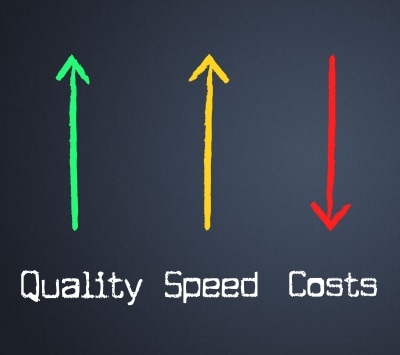 Image courtesy of Simon Howden at FreeDigitalPhotos.net Image courtesy of Simon Howden at FreeDigitalPhotos.net One of our projects located in a remote area of a foreign country required twenty thousand cubic meters of concrete, which was produced from our concrete mixing plant on site. We transported the cement for the concrete in bulk from a factory six hours drive from the site, using two of our own cement tankers. We couldn’t seem to get cement delivered fast enough and the project was constantly delayed due to shortages. Our cost reports showed we were losing money on concrete materials. The project team claimed the loss was because the client had requested more cement in the concrete and we would claim the additional costs from the client. The months went past and the continued to increase. Eventually, the project team undertook a reconciliation of concrete materials (something that should have been done from the start of the project) and found that more than half a million dollars of cement was unaccounted for. Further investigation found that when our drivers returned to the project site with a load of cement they made a detour, stopping off and discharging the cement from one of the tanker’s compartments, which they then sold. In fact, a third of every load of cement was being stolen from the truck en-route to the site. Not only was there the direct cost of the stolen cement, the project also had insufficient cement due to every truck only delivering two-thirds of what they should have, and the trucks taking a couple of hours longer on each return journey because of the detour to unload cement. By implementing suitable controls we were able to prevent further theft of cement and never ran short of cement again. But obviously, we were never going to recover the losses we had already incurred. The many forms of theft on construction projects Theft on construction projects takes many guises. Project sites can employ hundreds and even thousands of people from diverse backgrounds. Some of these employees are employed directly by the contractor while many are employed by subcontractors and suppliers working for the contractor. But often the client has their own workers on the project and they also even employ other contractors. Project sites can sometimes be difficult to secure as they can cover large areas and ongoing work can prevent the erection of permanent fencing. Equipment and deliveries are constantly entering and exiting premises. However, theft takes a multitude of forms and includes lots of white-collar crime. In fact, fraud often accounts for more theft than the direct theft of materials. Some forms of theft on construction include:
When we have theft we often only consider the direct cost of replacing the item. But the cost is often more than this. The cost may include: .......Continue Reading......... This article was first published on the ClockShark website. To visit this website and continue reading the article click on the link above.
Please share this post To read more about the author’s books and find out where you can purchase them visit the pages on this website by clicking the links below: 'Successful Construction Project Management: The Practical Guide' 'Building a Successful Construction Company: The Practical Guide' 'Construction Claims: A Short Guide for Contractors' 'Construction Project Management: Tips and Insights' 'Construction Book reviews' To read more about the author visit the page 'Paul Netscher' Want to contact Paul Netscher please enter your details on 'Contacts' Find out how Paul Netscher can help you Order your books from Amazon Order your books from Amazon UK © 2017 This article is not to be reproduced for commercial purposes without written permission from the author.
0 Comments
 Image courtesy of Ambro at FreeDigitalPhotos.net Image courtesy of Ambro at FreeDigitalPhotos.net Construction projects should have regular meetings between the client and the contractor. A written record, or minutes, should be kept of these meetings. Project meetings are usually an opportunity for project progress to be discussed and various issues to be raised, discussed and hopefully resolved. The agenda on these meetings could include:
The contractor’s Project Manager should:
This article was first published on the ClockShark website. To visit this website and continue reading the article click on the link above.
Please share this post To read more about the author’s books and find out where you can purchase them visit the pages on this website by clicking the links below: 'Successful Construction Project Management: The Practical Guide' 'Building a Successful Construction Company: The Practical Guide' 'Construction Claims: A Short Guide for Contractors' 'Construction Project Management: Tips and Insights' 'Construction Book reviews' To read more about the author visit the page 'Paul Netscher' Want to contact Paul Netscher please enter your details on 'Contacts' Find out how Paul Netscher can help you Order your books from Amazon Order your books from Amazon UK © 2017 This article is not to be reproduced for commercial purposes without written permission from the author.  Image courtesy of Stuart Miles at FreeDigitalPhotos.net Image courtesy of Stuart Miles at FreeDigitalPhotos.net Why do we have poor quality in construction? Recently I wrote an article ‘The True costs of Poor Quality Construction’ and how poor quality results in many hidden costs that contractors don’t fully understand. Many readers took the time to comment on the article and I am grateful for their feedback. Several people blamed the client for squeezing the contractor to provide a cheap price. There were other comments that clients were lowering the quality bar and were more accepting of poor quality. Now there is no doubt that in some cases clients award the contract to the contractor with the cheapest price – irrespective of whether the contractor has the experience, resources or knowledge to deliver a quality project. Disconcertingly, some also pointed out that in some countries corruption of the tender process also lead to unsuitable contractors being awarded projects they weren’t capable of delivering to the required standards. Further corruption meant that the client’s representatives ignored the poor quality. Some contractors just aren’t capable of producing a quality project and clients should take responsibility for appointing incapable contractors who then produce poor quality work. But ultimately contractors are responsible for producing quality work that satisfies the project standards and specifications, irrespective of what their price was. A contractor who blames their keen price for their poor quality is unacceptable. A client who accepts poor quality because they think that is the norm or can’t be bothered to ensure their contractor produces good quality deserves to live with a poor-quality project. But they are doing the construction industry a disservice and they’ll probably be the first to blame the contractor when things go wrong. I published another article ‘Does Anyone Care about Quality Anymore’ which explored the decline of service and quality and what we as customers and clients could do. There should be no excuse for poor quality work. Why do contractors produce poor quality work? There are many reasons for poor quality work which includes:
Conclusion
It is possible to produce good quality work. However it takes skilled people and commitment from all parties to ensure that the work satisfies the specifications and meet the quality standards. Contractors who produce poor quality work will be punished, it will ultimately cost them more, and their reputation will suffer. We all need to take pride in our work. We should never accept poor quality work and service, and we all should be training and mentoring the next generation. What will you do to ensure good quality work on your project? This article is adapted from information in the author’s popular books: 'Successful Construction Project Management: The Practical Guide' and 'Building a Successful Construction Company: The Practical Guide' and 'Construction Project Management: Tips and Insights' 'Construction Claims: A Short Guide for Contractors' has just been published. These books are available on Amazon and other online book stores. Paul publishes articles regularly on LinkedIn and his website. Paul writes regular articles for other websites, gives lectures, mentors, and is available for podcasts and interviews. © 2017 This article is not to be reproduced for commercial purposes without written permission from the author. In our post ’10 tips to to improve productivity on your project' we discussed how simple improvements in the way we do things on our construction projects can improve productivity. Even a 5% improvement in productivity could improve our profits by 20%. Have you put in place some of those tips and have they made a difference on your project? In this article, I discuss another 10 simple steps we can implement on our projects that will further improve productivity. #constructionprojectmanagement #productivityinconstruction Another 10 tips to improving productivity in construction
Improving construction productivity will pay dividendsDon’t let poor productivity cost your project time and money. Take the time to have a good hard look at the way your employees and your project is operating. Is the team working as efficiently as it should be? If it isn’t what can be done to improve efficiencies? The steps outlined above won’t cost more money and demand very little extra effort, and yet they can dramatically improve the profitability of your project. Please give us your ideas to improve productivity on our construction projects. #constructionproductivity #constructionmanagement #contractors This article was first published on the ClockShark website. Please share this post Do you want to learn how to manage construction projects successfully"A very readable and extremely practical guide for construction professionals. Honestly, this book is damn readable. It's more practical than I thought." (Reader Amazon.com) To read more about the author’s books and find out where you can purchase them visit the pages on this website by clicking the links below:
'Successful Construction Project Management: The Practical Guide' 'Building a Successful Construction Company: The Practical Guide' 'Construction Claims: A Short Guide for Contractors' 'Construction Project Management: Tips and Insights' 'Construction Book reviews' To read more about the author visit the page 'Paul Netscher' Want to contact Paul Netscher please enter your details on 'Contacts' Find out how Paul Netscher can help you Order your books from Amazon Order your books from Amazon UK © 2017 This article is not to be reproduced for commercial purposes without written permission from the author.  Image courtesy of Mister GC at FreeDigitalPhotos.net Image courtesy of Mister GC at FreeDigitalPhotos.net Will your customer be satisfied with their project? Children in many parts of the world will be getting excited that Christmas is near. Time to receive presents. I’m sure we all remember receiving presents as kids – whether for Christmas, a birthday or another holiday occasion. There’s always the anticipation of what we’ll get, and the excitement of unwrapping the present. Some adults still get excited at the thought of receiving a present. Tearing open the paper to see what we got. But all too often disappointment follows! It’s not that new train set or computer – just some boring socks, or maybe another multi-hued tie? Or, if it is a new computer, it isn’t the model we wanted? Then there are the presents that don’t fit, those that break after the first few uses. Some gadgets and toys require loads of batteries and they are more expensive to run than they were to purchase. Sometimes even when we get the present we were hoping for we become bored with it and it eventually lies forgotten at the back of the cupboard or ends up on the trash pile. How often are we disappointed when we open our presents? When your customer receives their completed project they’ll be just as excited. Will that excitement be followed by disappointment, just the same as that little child who didn’t receive the present they were really hoping for? What will your customer receive when they get their completed project? It’s important that our customers are happy with their project. Disappointment will linger long after the customer moves in – sometimes even for the life of the project. It’s often the contractor that will be blamed for this disappointment. This disappointment may lead to the customer withholding money, calling the contractor back to rectify defects and problems and the customer not using the contractor on their future projects. In some cases the customer may even institute legal action against the contractor, and of course, in almost all cases the customer will harm the contractor’s reputation by telling everyone how disappointed they were with their project and the contractor. So what will your customer receive?
This article was first published on the ClockShark website. To visit this website and continue reading the article click on the link above.
Please share this post To read more about the author’s books and find out where you can purchase them visit the pages on this website by clicking the links below: 'Successful Construction Project Management: The Practical Guide' 'Building a Successful Construction Company: The Practical Guide' 'Construction Claims: A Short Guide for Contractors' 'Construction Project Management: Tips and Insights' 'Construction Book reviews' To read more about the author visit the page 'Paul Netscher' Want to contact Paul Netscher please enter your details on 'Contacts' Find out how Paul Netscher can help you Order your books from Amazon Order your books from Amazon UK © 2017 This article is not to be reproduced for commercial purposes without written permission from the author. |
Archives
June 2024
Note: We welcome genuine comments, especially comments that add additional information to the subject matter in the article. We however reserve the right to remove inappropriate comments, which includes comments that have nothing to do with the subject, comments that include inappropriate language, and comments that are an advertisement for a product or company, or which include an advertising link. Comments must be in English. We will not enter into discussion on why a particular comment was removed.
CategoriesCopyright 2016 - The attached articles cannot be reproduced for commercial purposes without the consent of the author.
The opinions expressed in the attached articles are those of the writer. It should be noted that projects are varied and different laws and restrictions apply which depend on the location of the contractor and the project. It's important that the reader uses the supplied information taking cognisance of their particular circumstances. The writer assumes no responsibility or liability for any loss of any kind arising from the reader using the information or advice contained herein. "I have what I consider some of the best books on construction management."
Books are available from: Amazon.com Amazon.co.uk takealot.com kalahari.com Amazon.in Amazon.de Amazon.fr Amazon.it Amazon.com.au Powell's Fishpond uread bokus Amazon.ca Amazon.es Other retail stores Available in paperback or on Kindle "28 YEARS OF CONSTRUCTION PROJECT MANAGEMENT EXPERIENCE, DEVELOPING SUCCESSFUL CONSTRUCTION PROJECT MANAGERS AND BUILDING SUCCESSFUL CONSTRUCTION COMPANIES"
|





 RSS Feed
RSS Feed




